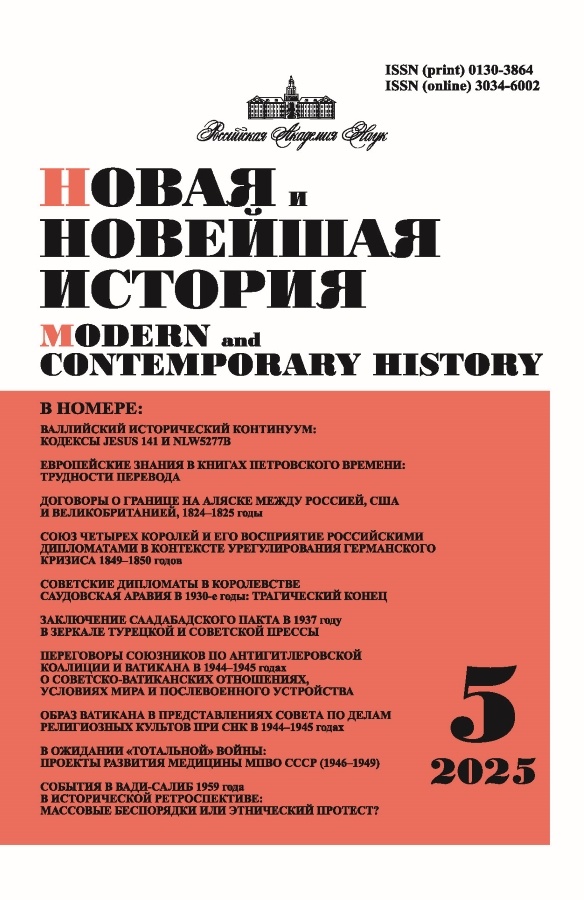External Relations of the Canton of Zurich in 2005–2024: Institutions, Priorities, and Main Directions
- Authors: Minkova K.V.1, Subbotin I.A.1,2
-
Affiliations:
- Saint-Petersburg State University
- MGIMO University
- Issue: No 5 (2025)
- Pages: 226-239
- Section: Contemporary history
- URL: https://jdigitaldiagnostics.com/0130-3864/article/view/693055
- DOI: https://doi.org/10.31857/S0130386425050177
- ID: 693055
Cite item
Abstract
The study of the external relations of constituent units within federal states – particularly Switzerland – is of enduring scholarly interest for several reasons. Firstly, an examination of the specific experience of the Swiss cantons in the sphere of external engagement may offer valuable insights for enhancing the external relations frameworks of Russia’s federal subjects. Secondly, an analysis of the division of powers between the federal government and the cantons could contribute to the further development of the Russian model of federalism. This article aims to identify the principal features of the Canton of Zurich’s external relations in the period from 2005 to 2024. To this end, it examines the legal and institutional foundations underpinning Zurich’s external engagement, outlines its priorities and interests, and analyses the main directions pursued over this period. The specific focus on Zurich enables a detailed exploration of the theoretical and practical dimensions of subnational external relations in Switzerland – an area that has received limited attention in both Russian and international scholarship to date. The study concludes that the Canton of Zurich enjoys substantial autonomy in this domain and has developed a range of innovative mechanisms to advance its interests abroad. The sophistication of Zurich’s external relations, together with the strengths of the Swiss federal model more broadly, may serve as a useful point of reference for Russian regions – particularly those that are economically advanced and situated along national borders.
About the authors
K. V. Minkova
Saint-Petersburg State University
Author for correspondence.
Email: k.minkova@spbu.ru
Saint-Petersburg, Russia
I. A. Subbotin
Saint-Petersburg State University; MGIMO University
Email: iliasubb@mail.ru
Saint-Petersburg, Russia; Moscow, Russia
References
- Akimov Yu.G. International activities of subnational actors and foreign policy of the nation state: models of interaction and interpretations // Comparative Politics. 2021. Vol. 12. № 3. P. 33–41. (In Russ.)
- Akimov Yu.G. Constitutionalism and international activities the provinces/regions of federations (the case of Canada, Belgium and Spain) // Works of the Department of Modern and Contemporary History. 2014. № 12. P. 97–107. (In Russ.)
- Babynina L.O. Govorov N.V., Timoshenkova E.P. European Union and Switzerland: contrary vectors of cooperation // Contemporary Europe. 2015. № 2. P. 34–47. (In Russ.)
- Dubrovina O.Y. Switzerland: the Delimitation of Powers Between the Confederation and the Cantons in the Field of International Relations // Contemporary Europe. 2019. № 1. P. 70–79. (In Russ.)
- Dubrovina O.Y. The Influence of Regions of States on the Foreign Policy and International Relations. Moscow, 2018. (In Russ.)
- Ermakova E.V. Growing Significance of EU Institutions in Promotion of Inter-regional policies // MGIMO Review of International Relations. 2014. № 4. P. 222–230. (In Russ.)
- Kolykhalov M.I. The Model and Features of International Relations of the Cantons of Switzerland // Power. 2017. № 7. P. 182–186. (In Russ.)
- Logvinova I.V. Cantons’ international links in Switzerland. Issues of law and administration // RSUH/RGGU Bulletin. Series Economics. Management. Law. 2020. № 3. P. 122–133. (In Russ.)
- Plotnikova O.V., Dubrovina O.Y. International Connections of Regions of States: Characteristics and Features. Moscow, 2020. (In Russ.)
- Stepanova S.V. Switzerland and European Union: the development of relations // The Bulletin of Ryazan State University named for S.A. Yesenin. 2016. № 2. P. 82–90. (In Russ.)
- Barnett L. Canada’s Approach to the Treaty-Making Process. Ottawa, 2021.
- Bochsler D. Neighbours or Friends? When Swiss Cantonal Governments Co-operate with Each Other // Regional and Federal Studies. 2009. Vol. 19. № 3. P. 349–370.
- Duchacek I.D. Perforated Sovereignties: Towards a Typology of New Actors in International Relations // Federalism and International Relations: The Role of Subnational Units / eds H.J. Michelmann, P. Soldatos. Oxford, 1990. P. 1–33.
- Freiburghaus R. Lobbyierende Kantone: Subnationale Interessenvertretung im Schweizer Föderalismus. Baden-Baden, 2024.
- Kuznetsov A. Theory and Practice of Paradiplomacy: Subnational Governments in International Affairs. London; New York, 2015.
- Morin J.-F., Fournier V., Paquin S. The Federated Entities in Environmental Treaties (FEET) Dataset: Questioning Conventional Wisdom on Green Paradiplomacy // Canadian Journal of Political Science. 2022. Vol. 55. P. 226–241.
- Soldatos P. An Explanatory Framework for the Study of Federated States as Foreign-Policy Actors // Federalism and International Relations: The Role of Subnational Units / eds H.J. Michelmann, P. Soldatos. Oxford, 1990. P. 34–57.
- Spatial Planning and Sustainable Development Working Group of the Alpine Convention. Cross-border spatial development in the Alpine Convention area. Bozen, 2022.
- Wildhaber L. External Relations of the Swiss Cantons // Canadian Yearbook of International Law. 1974. Vol. 12. P. 211–221.
- Wolff S. Paradiplomacy: Scope, Opportunities and Challenges // The SAIS Europe Journal of Global Affairs. 2007. Vol. 10. P. 141–150.
Supplementary files










